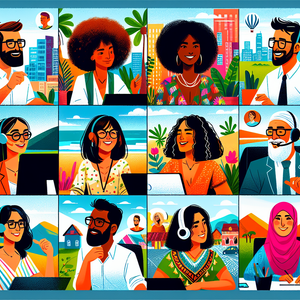The Future of Diabetes Technology and Career Opportunities at Dexcom

The diabetes technology sector is experiencing rapid innovation, driven by advancements in data analytics, wearable technology, and artificial intelligence. Continuous glucose monitoring (CGM) systems, like those developed by Dexcom, allow patients to track their glucose levels in real-time, significantly improving their ability to manage their condition. These devices provide invaluable data that can lead to improved patient outcomes by enabling timely interventions. One notable example of innovation in this space is the integration of artificial intelligence in diabetes management systems. AI enhances predictive capabilities, helping patients anticipate fluctuations in their glucose levels. For instance, Dexcom’s algorithms can analyze trends in a user's glucose data and provide alerts about potential highs or lows, allowing for proactive management. This not only improves patient outcomes but also opens doors for data scientists and software engineers who can develop and maintain these complex algorithms. Moreover, the rise of telehealth and digital health platforms has transformed how diabetes care is delivered. Patients can now receive consultations remotely, and healthcare providers can monitor their patients' glucose levels from afar, making diabetes management more accessible. This shift towards digital health creates new opportunities for professionals skilled in telemedicine technology, user interface design, and patient engagement strategies.
Skills in Demand
As Dexcom and similar companies continue to innovate, certain skills are becoming increasingly valuable in the job market. Technical expertise in software development, data analytics, and biomedical engineering is essential. Professionals in these fields must be proficient in programming languages, data visualization tools, and statistical analysis software. However, soft skills should not be overlooked. Professionals who can communicate effectively, work collaboratively in interdisciplinary teams, and demonstrate adaptability are highly sought after. For example, a software engineer working on a CGM app must collaborate with healthcare professionals to ensure the technology meets patient needs and regulatory standards. Moreover, understanding regulatory requirements and compliance in the medical technology industry is crucial. Professionals who possess a mix of technical acumen and knowledge of healthcare regulations will have a competitive edge in the job market. A thorough understanding of the FDA’s regulations on medical devices, for instance, can significantly enhance a candidate’s appeal to employers like Dexcom.
Preparing for Future Roles
For those looking to build a career at Dexcom or in the broader field of diabetes technology, preparation is key. Aspiring candidates should consider pursuing relevant degrees in fields such as biomedical engineering, computer science, or healthcare administration. For example, a degree in biomedical engineering provides a solid foundation in both engineering principles and medical applications, making graduates well-suited for roles in medical device development. Additionally, gaining hands-on experience through internships or co-op programs can provide invaluable insights into the industry and help build a professional network. Internships at companies like Dexcom can expose candidates to real-world challenges and innovations in diabetes technology. Continuous learning is also vital in this rapidly changing field. Professionals should stay abreast of the latest trends and advancements in diabetes technology by attending conferences, participating in workshops, and engaging with industry publications. Online courses and certifications in emerging technologies, such as machine learning or data analytics, can further enhance one’s skill set. The ability to apply these technologies in a healthcare context is increasingly valuable.
The future of diabetes technology is bright, and companies like Dexcom are leading the charge towards innovative solutions that improve patient care. As emerging technologies reshape the landscape, they also create a wealth of career opportunities for individuals equipped with the right skills and knowledge. By understanding these trends and preparing accordingly, aspiring professionals can position themselves for success in this dynamic field. The ongoing commitment to innovation and patient care at Dexcom not only promises exciting advancements in diabetes management but also a fulfilling career path for those who choose to embark on this journey. With the growing global focus on chronic disease management, the potential for impact and advancement in diabetes technology is vast, making it an exciting time to consider a career in this sector.
Data Scientist - Diabetes Analytics
Dexcom, Abbott Laboratories, Medtronic
Core Responsibilities
Analyze complex diabetes-related data sets to identify trends and insights that can improve patient outcomes.
Develop predictive models using machine learning algorithms to forecast glucose level fluctuations.
Collaborate with healthcare professionals to translate data findings into actionable clinical recommendations.
Required Skills
Proficiency in programming languages such as Python or R, with a solid understanding of machine learning techniques.
Experience with data visualization tools like Tableau or Power BI, and familiarity with statistical analysis software.
Strong problem-solving skills and the ability to communicate technical concepts to non-technical stakeholders.
Biomedical Engineer - Device Development
Dexcom, Boston Scientific, Siemens Healthineers
Core Responsibilities
Design, test, and improve continuous glucose monitoring (CGM) devices, focusing on functionality and user experience.
Conduct feasibility studies and prototype testing to ensure devices meet regulatory standards and patient needs.
Collaborate with cross-functional teams, including software developers and regulatory affairs, to bring devices from concept to market.
Required Skills
A degree in biomedical engineering or a closely related field, with hands-on experience in medical device design.
Knowledge of FDA regulations and quality control processes specific to medical device manufacturing.
Proficiency in CAD software and familiarity with materials used in medical devices.
Telehealth Product Manager
Dexcom, Teladoc Health, Amwell
Core Responsibilities
Oversee the development and enhancement of telehealth platforms for diabetes management services.
Conduct market research to identify patient and healthcare provider needs, ensuring the product aligns with user expectations.
Coordinate with software engineers, UX designers, and marketing teams to launch new features and services.
Required Skills
Proven experience in product management, especially in health tech or telemedicine.
Strong understanding of user experience design principles and telehealth regulations.
Excellent communication and project management skills, with the ability to work in agile environments.
Regulatory Affairs Specialist - Medical Devices
Dexcom, Johnson & Johnson, Stryker
Core Responsibilities
Ensure compliance with FDA and international regulations for diabetes management devices and software.
Prepare and submit documentation for product approvals, including 510(k) submissions and technical files.
Monitor regulatory changes and communicate their impact on product development to internal teams.
Required Skills
A strong understanding of medical device regulations and experience with regulatory submissions.
Detail-oriented with excellent written communication skills for drafting regulatory documents.
Ability to work collaboratively with engineering, quality assurance, and marketing departments.
Software Engineer - Mobile Health Applications
Dexcom, Fitbit, Apple Health
Core Responsibilities
Develop and maintain mobile applications that integrate with CGM devices for real-time glucose monitoring.
Work closely with UX/UI designers to create user-friendly interfaces that enhance patient engagement.
Implement data security protocols to ensure patient data confidentiality and compliance with healthcare regulations.
Required Skills
Proficiency in programming languages such as Swift (for iOS) or Kotlin (for Android), along with experience in mobile app development frameworks.
Understanding of healthcare data standards, such as HL7 or FHIR, and their application in mobile health technologies.
Strong problem-solving abilities and a passion for improving patient care through technology.


